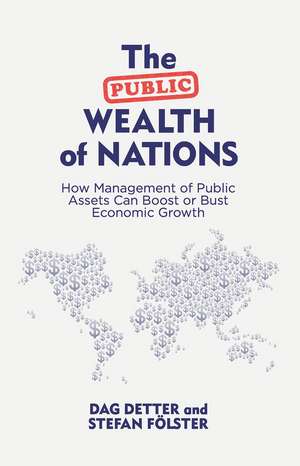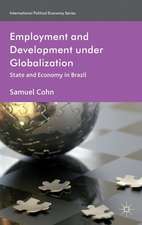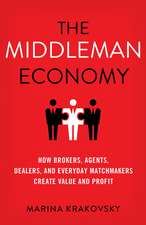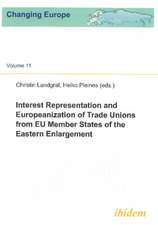The Public Wealth of Nations: How Management of Public Assets Can Boost or Bust Economic Growth
Autor Dag Detter, Stefan Fölsteren Limba Engleză Hardback – 29 iun 2015
Don’t worry about who owns those assets, worry about whether they are managed effectively.
Why does this matter? Because despite the Thatcher/ Reagan economic revolution, the largest pool of wealth in the world – a global total that is much larger than the world’s total pensions savings, and ten times the total of all the sovereign wealth funds on the planet – is still comprised of commercial assets that are held in public ownership. If professionally managed, they could generate an annual yield of 2.7 trillion dollars, more than current global spending on infrastructure: transport, power, water, and communications.
Based on both economic research and hands-on experience from many countries, the authors argue that publicly owned commercial assets need to be taken out of the direct and distorting control of politicians and placed under professional management in a ‘National Wealth Fund’ or its local government equivalent. Such a move would trigger much-needed structural reforms in national economies, thus resurrect strained government finances, bolster ailing economic growth, and improve the fabric of democratic institutions.
This radical, reforming book was named one of the "Books of the Year".by both the FT and The Economist.
| Toate formatele și edițiile | Preț | Express |
|---|---|---|
| Paperback (1) | 232.59 lei 6-8 săpt. | |
| Palgrave Macmillan UK – 16 sep 2017 | 232.59 lei 6-8 săpt. | |
| Hardback (1) | 270.57 lei 3-5 săpt. | |
| Palgrave Macmillan UK – 29 iun 2015 | 270.57 lei 3-5 săpt. |
Preț: 270.57 lei
Nou
Puncte Express: 406
Preț estimativ în valută:
51.77€ • 54.17$ • 43.01£
51.77€ • 54.17$ • 43.01£
Carte disponibilă
Livrare economică 13-27 martie
Preluare comenzi: 021 569.72.76
Specificații
ISBN-13: 9781137519849
ISBN-10: 1137519843
Pagini: 244
Ilustrații: XIV, 230 p.
Dimensiuni: 140 x 216 x 23 mm
Greutate: 0.43 kg
Ediția:2015
Editura: Palgrave Macmillan UK
Colecția Palgrave Macmillan
Locul publicării:London, United Kingdom
ISBN-10: 1137519843
Pagini: 244
Ilustrații: XIV, 230 p.
Dimensiuni: 140 x 216 x 23 mm
Greutate: 0.43 kg
Ediția:2015
Editura: Palgrave Macmillan UK
Colecția Palgrave Macmillan
Locul publicării:London, United Kingdom
Cuprins
1. What can public wealth do for you? 2. Don't rock the boat and the hand that feeds you - the cost of poor management 3. How state run business can ruin the economy and politics 4. The size and potential of public wealth 5. Attempts to reform management of public wealth 6. Active owner or Privatise - Swedish and Asian pioneers vs Thatcher 7. Monetising yields value, and improves democracy as well 8. The anatomy of National Wealth Funds 9. Strategies for creating value 10. We all want to build roads now but can we afford it? 11. How politicians can become consumer advocates instead of quasi-capitalists
Recenzii
“I recommended Detter and Folster’s The Public Wealth of Nations, a smart read that pulls data and management strategies from throughout the globe in order to argue for ways we can add value to public assets and hence increase economic growth.” (The Philadelphia Citizen, thephiladelphiacitizen.org, December, 2016)
“Detter (formerly, Swedish Ministry of Industry) and Fölster (Reform Institute, Sweden) contend that democracy works best when governments have little direct access to public wealth. … The authors present a compelling argument that better management of publicly owned assets would improve economic welfare … . Summing Up: Highly recommended. Upper-division undergraduates through faculty.” (R. E. Schenk, Choice, Vol. 53 (12), August, 2016)
“Detter (formerly, Swedish Ministry of Industry) and Fölster (Reform Institute, Sweden) contend that democracy works best when governments have little direct access to public wealth. … The authors present a compelling argument that better management of publicly owned assets would improve economic welfare … . Summing Up: Highly recommended. Upper-division undergraduates through faculty.” (R. E. Schenk, Choice, Vol. 53 (12), August, 2016)
Notă biografică
Dag Detter is an advisor to investors in Europe and Asia, specialized in identifying under-performing high potential assets. As President of Stattum, the Swedish government holding company, and a Director at the Ministry of Industry, he led the first deep-rooted transformation of state commercial assets. He has worked extensively as an investment banker and advisor within the corporate, real estate and financial sector in Asia and Europe.
Stefan Fölster is The Managing Director of the Reform Institute (a market-oriented think tank in Stockholm with a focus on innovative reforms). He was previously the Chief Economist for the Confederation of Swedish Enterprise. He has authored many articles and books, for example the recent Renaissance of Reforms published jointly by the IEA and Timbro.
Stefan Fölster is The Managing Director of the Reform Institute (a market-oriented think tank in Stockholm with a focus on innovative reforms). He was previously the Chief Economist for the Confederation of Swedish Enterprise. He has authored many articles and books, for example the recent Renaissance of Reforms published jointly by the IEA and Timbro.
Textul de pe ultima copertă
We have spent the last three decades engaged in a pointless and irrelevant debate about the relative merits of privatization or nationalization. We have been arguing about the wrong thing while sitting on a goldmine of assets.
Don’t worry about who owns those assets, worry about whether they are managed effectively.
Why does this matter? Because despite the Thatcher/ Reagan economic revolution, the largest pool of wealth in the world – a global total that is much larger than the world’s total pensions savings, and ten times the total of all the sovereign wealth funds on the planet – is still comprised of commercial assets that are held in public ownership. If professionally managed, they could generate an annual yield of 2.7 trillion dollars, more than current global spending on infrastructure: transport, power, water, and communications.
Based on both economic research and hands-on experience from many countries, the authors argue that publicly owned commercial assets need to be taken out of the direct and distorting control of politicians and placed under professional management in a ‘National Wealth Fund’ or its local government equivalent. Such a move would trigger much-needed structural reforms in national economies, thus resurrect strained government finances, bolster ailing economic growth, and improve the fabric of democratic institutions.
Why does this matter? Because despite the Thatcher/ Reagan economic revolution, the largest pool of wealth in the world – a global total that is much larger than the world’s total pensions savings, and ten times the total of all the sovereign wealth funds on the planet – is still comprised of commercial assets that are held in public ownership. If professionally managed, they could generate an annual yield of 2.7 trillion dollars, more than current global spending on infrastructure: transport, power, water, and communications.
Based on both economic research and hands-on experience from many countries, the authors argue that publicly owned commercial assets need to be taken out of the direct and distorting control of politicians and placed under professional management in a ‘National Wealth Fund’ or its local government equivalent. Such a move would trigger much-needed structural reforms in national economies, thus resurrect strained government finances, bolster ailing economic growth, and improve the fabric of democratic institutions.
Caracteristici
A genuinely new idea backed by solid evidence The first ever reliable estimate of the value of the world's publically held commercial assets















